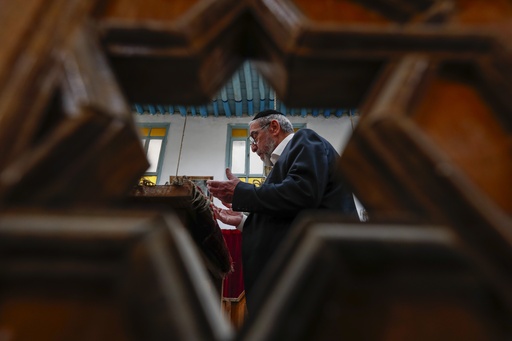
The Hamra family’s return was as part of a group organized by the Syrian Emergency Task Force, a nonprofit based in the U.S., following the recent political changes in Syria after the fall of former President Bashar Assad’s government.
Despite the lengthy absence, their Christian neighbors quickly recognized Yusuf as he walked the streets. An enthusiastic reunion unfolded, filled with nostalgic memories and updates about family and friends, including news of who had married whom and who had migrated elsewhere.
“Although I left Syria, Syria never left us,” Henry shared, reflecting on his experiences having been just 15 years old when his family relocated to New York.
During their visit, the Hamra family prayed at the al-Franj synagogue, which had been neglected over the years. Yusuf had served as the rabbi there, located in what retains the name Jewish quarter within the old city of Damascus, home now to only a few remaining Jewish families. They also visited the Jobar synagogue, once magnificent but now severely damaged and looted as a consequence of Syria’s extensive civil conflict spanning nearly 14 years.
“May God help us, this won’t be rebuilt for decades,” Yusuf remarked as he scanned the devastation surrounding him.
Historically, even prior to the eruption of mass protests against the government in 2011, which led to a violent crackdown and civil war, Syria’s Jewish population had significantly dwindled. At the dawn of the 20th century, the Jewish community numbered approximately 100,000. However, following the establishment of the state of Israel in 1948, tensions escalated, prompting many Syrian Jews to emigrate to Israel, the U.S., and beyond.
Under the Assad family’s stringent rule lasting 54 years, Syrian Jews could practice their faith but often faced distrust, with many suspected of being spies or collaborators with Israel. Travel bans enforced until the early 1990s restricted their movements. Following the end of these travel restrictions in 1992 amid a wave of Arab-Israeli peace talks, most of the remaining Jewish population, estimated at around 4,500, chose to leave, with the Hamras also relocating to New York, where they formed a robust community.
Henry recalled living under constant apprehension of the oppressive Syrian intelligence services, an experience shared by many Syrians regardless of their faith, yet amplified for Jews facing heightened scrutiny. Nonetheless, he treasured the close relationships his family developed with their Muslim and Christian neighbors.
Mouaz Moustafa, the executive director of the Syrian Emergency Task Force, expressed hope that this visit would inspire other Syrian Jews to return and advocate for the U.S. to lift sanctions imposed during the Assad presidency.
Moustafa also stressed that the new Syrian leadership, now represented by interim President Ahmad al-Sharaa, previously of the Islamist group Hayat Tahrir al-Sham (HTS), is committed to inclusivity and protection of minority communities. In his communication with al-Sharaa, Yusuf conveyed that the Syrian Jewish diaspora maintains a profound connection to Syria and views itself as an integral part of the nation’s cultural and historical fabric.
While the welcome they received in Damascus was encouraging, some skepticism arose regarding the political implications of their visit, particularly concerning potential normalization of relations with Israel—a notion that Moustafa denied.
The Hamras conveyed a deep emotional response to their homecoming, though they both acknowledged their hesitation to consider a permanent move back to a war-torn Damascus with crumbling infrastructure.
“It’s tough to live without electricity or clean water. In New York, we enjoy constant electricity and internet, so moving back here is extremely challenging,” Henry elaborated. Yusuf added that no one is likely to rush into relocating but expressed a hope that more Syrian Jews living abroad might visit, which could ultimately pave the way for future returns. “It depends on each individual’s situation, but we hope they will come, see the changes, and decide what they want moving forward,” he stated.

